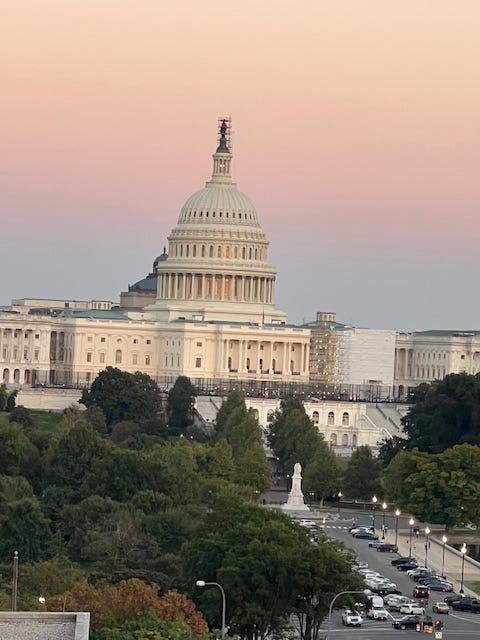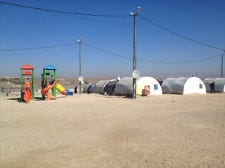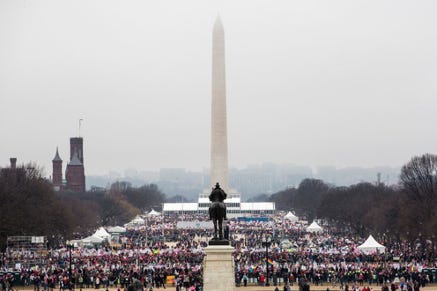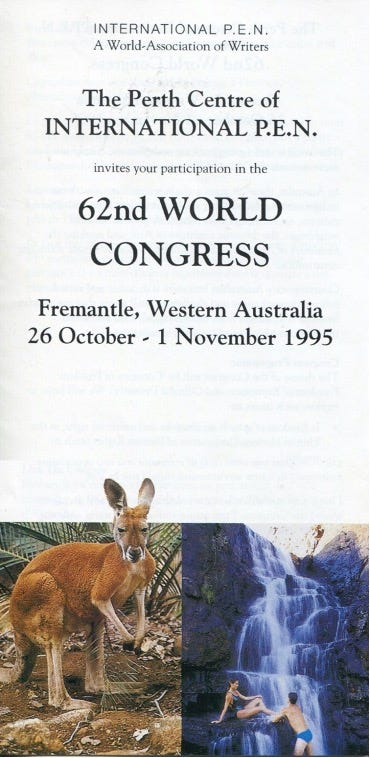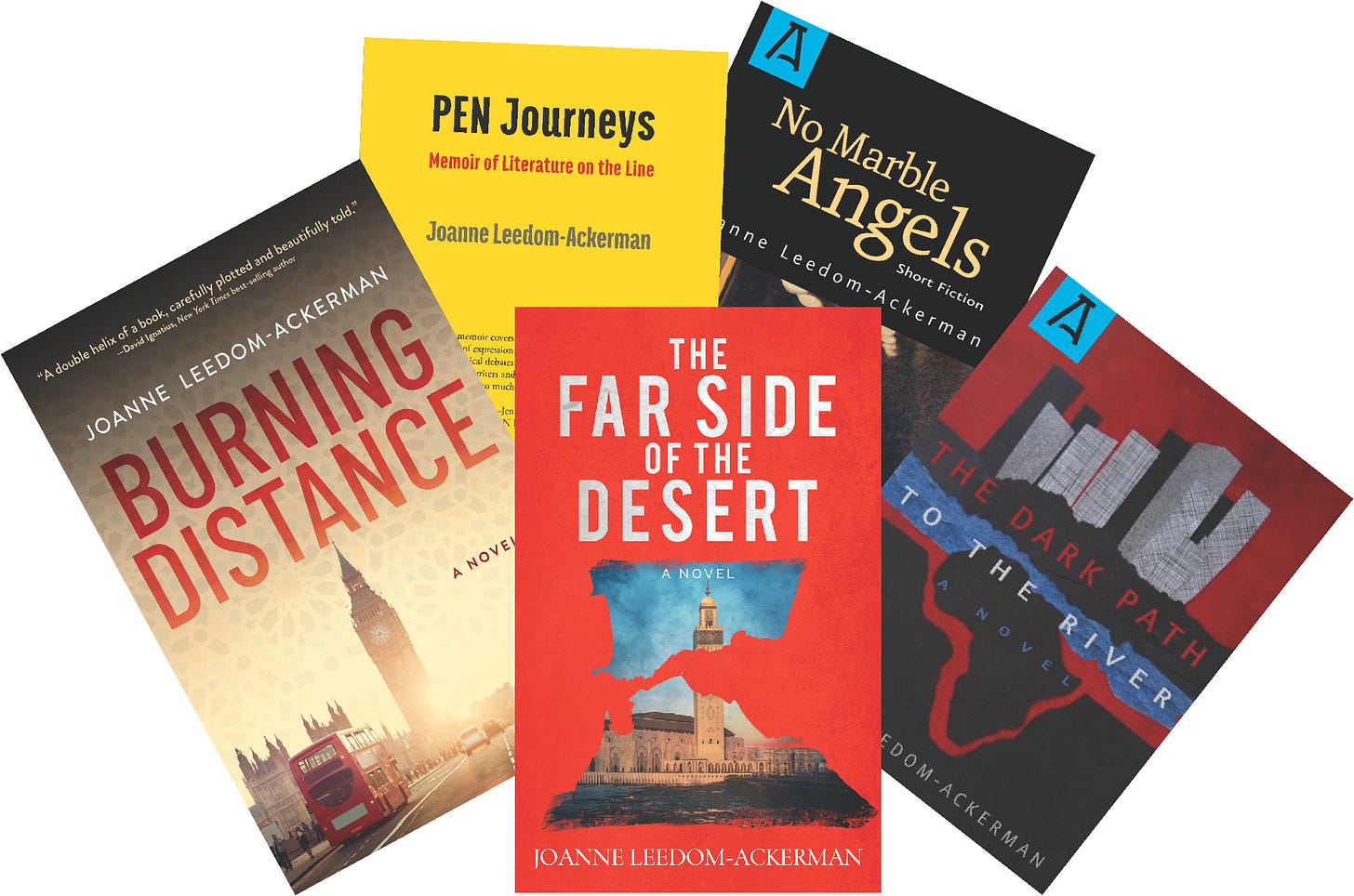On the Move—New Year, New Day, New Thoughts…
Dear Friends,
Welcome to January’s Substack.
This month I celebrate the arrival of early copies of my novel The Far Side of the Desert and in Books to Check Out celebrate the upcoming novel Ilium by Lea Carpenter and 2054 by Elliot Ackerman and Admiral James Stavridis—a big publication year for our family. Preorders much appreciated!
In the blog On the Move—New Year, New Day, New Thoughts… I share observations of years past and ahead.
The Writer at Risk section focuses on the case of Egyptian poet and lyricist Galal El-Behairy, imprisoned six years, well past the legal limit for pre-trial detention.
In Words of the Month you’ll find a few words you may never use but might like to know.
I hope you’ll enjoy these and other features and subscribe if you haven’t already. It’s free!
Early copies of The Far Side of the Desert arrived at my home over the holidays and are due in stores and online March 5, 2024. I I hope you’ll read and enjoy this story of a diplomatic family, in particular two sisters and a brother, one of whom disappears on a vacation during a terrorist attack and proves impossible to find. Moving from Washington to London to Cairo, from Spain to the Sahara to Morocco to Gibraltar, The Far Side of the Desert is a family drama and political thriller which explores links of terrorism, crime, and financial manipulation.
“The Far Side of the Desert is that rare story – a literary work and a first-rate thriller. Joanne Leedom-Ackerman, who has traveled the world advocating for human rights, is one of the few writers today who can construct a superb and complex international spy novel. The Far Side of the Desert is stellar.”
—Jennifer Clement, former President PEN International and author of award-winning Prayers for the Stolen, GunLove and upcoming The Promised Party
“The Far Side of the Desert is a riveting thriller with richly nuanced characters and fast-paced action. The plot imaginatively taps into recent history to illustrate the human dimensions of terrorism—both the complex psyche of the perpetrators and the gnawing questions among those sucked into their vortex. I binged until the end.”
—Robin Wright, award-winning journalist and author of Sacred Rage and Rock the Casbah
The paperback of Burning Distance will be published February 20, 2024.
“Burning Distance is a double helix of a book, carefully plotted and beautifully told. It’s a spy story interwoven with a love story, and the strands fit together in a way that moves the reader effortlessly from chapter to chapter. While fiction, its narrative of the CIA and the Middle East arms trade are very close to fact. Joanne Leedom-Ackerman observes the world of American spies and Arab fixers through the eyes of a young woman who keeps asking questions about her mysterious past until she gets all the revelatory answers. A subtle and satisfying novel.”
—David Ignatius, New York Times best-selling author of The Director, The Quantum Spy, The Paladin and Washington Post columnist
On the Move—New Year, New Day, New Thoughts…
Nobel physicist Albert Einstein advised: “We cannot solve our problems with the same thinking that created them,” and he urged a new way of thinking. Embedded in the advice was the challenge to understand what that thinking was. Einstein was considering the state of affairs after a world war and the devastation of atomic bombs as citizens sought ways to assure peace in the future.
The advice resonates both at a global and personal level. I’ve heard the story of a highly successful coach who instead of getting angry when one of his athletes made a mistake, would ask: “What were you thinking?” in the hope the individual might self-correct.
Thinking is where action launches and is what determines its direction and often its success or failure.
As the new year begins, we’re lured into resolutions, some we’ll keep, but many we may not even remember the following year. If we could at least not repeat mistakes with circular thinking and instead listen to thinking that leads to solutions, we might be on our way.
In considering this new year’s post, I reviewed my January blogs from the last 15 years. They are a small geo-chronological slice of observations, not always tracking progress but opening a window onto a world looking for answers.
(You can click on each title to if you want to read the whole.)
January 2009: When the Crowds Go Home, Ideas Keep Traveling:
The crowds have left; the reviewing stands disassembled. The reflecting pool is frozen with sea gulls light-footing across it. Washington, DC has held its grand party. For three days, everyone was on foot, bundled in coats, scarves, gloves and walking everywhere–to the Mall, to the Capitol, to the White House (or as close as one could get), peering over barricades, hundreds of thousands of people.
Most of those who came to town have returned to all the states in the union from which they came. Those from the more than 100 foreign countries here to watch the Inauguration have also returned. As the full working week commenced in Washington, snowflakes were falling; the sky was cloudy, and the Potomac River, crusted with ice at the edges, waited for spring.
But the spirit remained. And the consequences of this global gathering were only beginning. Among those visiting Washington were women from the world’s conflict regions, women engaged in peace building, who were gathered to share experiences and also to study and watch the U.S. electoral process, particularly as it might apply to their circumstances and lives….
[After the Inauguration of President Barack Obama]
January 2010: Haitian Farewell:
I met Haitian writer Georges Anglade, a bear of a man with a curly gray beard, in the Arctic Circle, in Tromso, Norway in 2004. He spilled a glass of red wine on me. We were at the opening reception of International PEN’s Congress, and whether we were moving in the same or opposite directions around the hors d’oeuvres table or he was gesturing with enthusiasm with his wine glass in his hand, I no longer remember; but the flow of wine down my black suit we both remembered every time we saw each other in the years that followed. It bound us in a moment of surprise and laughter and a kind of instant friendship as if I had been christened by him….
[Memory after the Haiti earthquake of 2010 that killed writer and Haitian PEN President Georges Anglade]
January 2011: Ice Flows: Freedom of Expression:
The Potomac River in Washington is frozen, though only with a light crust of ice, not like the Charles River in Boston which appears a solid block that one might stomp across all the way to Cambridge, though in the center a soft spot could crack open at any moment. Measuring the solidity of surfaces can be a matter of life and death.
The image of frozen surfaces arose as I was reviewing for a talk the appeals sent on behalf of writers in prison or killed for their work in the past year….
January 2012: Voices Around the World:
I began this blog four years ago with modest ambition. Once a month I would pause from writing fiction or other work and weave disparate threads of the month’s events and my thoughts together and share in this new form: the blog post. The posts have often had international themes and freedom of expression themes because work and life lead me to other areas of the world and because the freedom of the individual to write, speak and think is fundamental, especially for a writer.
By posting a monthly blog I also sought to join the 21st century in digital form, but the digital century is rushing so fast that a website with a blog post seems almost obsolete. (By next month I hope to have joined, or at least touched, the social media by also posting on an “author’s page” on Facebook.) Whatever the medium, however, the message remains, and the connection of voices around the world has become transformative.
Each month notices of writers under threat come across my desk. I find myself studying the pictures of the writers when there are pictures, writing down their names, and when available, reading some of their work to make them real in my own mind and imagination and later to share their work, which governments hope to silence…
January 2013: Sunrise in Islamabad:
As I leave Washington, DC, the sun is sinking as a gauzy pink globe just beyond the runway. I imagine it about to rise over my destination: Islamabad.
This will be my first trip to Pakistan, a country where I have friends and colleagues, but we always meet outside of Pakistan. For me the country is still a place in imagination. The picture is drawn with many strokes, beginning with media images of bustling streets in Islamabad, Lahore and Karachi, of barren rocky mountain sides in the tribal territories, images of markets and cafes and dark streets in the novels of Pakistani writers, stories of friends’ childhoods, particularly stories of women who at great odds rose to become voices and leaders in the country, and by the headlines of terrorist attacks….
[On a delegation of writers to Pakistan with the International Center for Journalists]
January 2014: Syrian Refugee Tsunami:
We’d come to visit a Syrian refugee camp on the Turkish border. When we arrived in Gaziantep, a bustling ancient city just 30 miles from Syria, we were told by United Nations representatives that a battle was going on across the border that day. A bullet had struck a house in the nearby refugee camp so our visit was canceled for security reasons.
The following day a fuller story emerged. In the Syrian town of Jarabulus just 3km over the border, the battle had been especially brutal. At least 10 men were beheaded and their heads mounted on spikes to terrorize the community. The Syrians from the town were now fleeing to Turkey and away from the al Qaeda-linked fighters.
This particularly grisly battle underscores the horror and tragedy facing the almost nine million Syrians (6.5 million in country; at least 2.3 million outside the country) seeking security. Aid agencies estimate at least half the Syrian population of 22.4 million is in need of humanitarian assistance, and as many as three quarters of the population will be in need of aid by the end of 2014….
[On a delegation with UNHCR]
January 2015—No blog posted
January 2016: View on the Bosphorus: Rights in Retreat:
I’m sitting on the Bosphorus today in Istanbul looking across to the Asian side over the balustrade of a European porch. I’ve been visiting Istanbul over the last 20 years for conferences, recently for visits to refugee camps and most often now to see family living here. Istanbul is one of my favorite cities, full of heart, multiple cultures, history and citizens of intellect and warmth.
But recently the atmosphere has chilled. I’ve come on this trip to participate in the launch of Human Rights Watch’s 2016 World Report which focuses on the “Politics of Fear and the Crushing of Civil Society” as causes that imperil citizens’ rights around the world. Istanbul was chosen as the launch city because it sits at the nexus of east and west, is the crossing point for millions of refugees fleeing the Syrian war and has an active civil society and free press that are now severely tested as the environment for rights deteriorates….

January 2017: Power on Loan:
The first march I covered as a journalist was a massive anti-war moratorium in Boston in the spring of 1970, part of nationwide protests; Boston was one of the hub cities. The demonstrators walked peacefully from the Boston Commons through the city to Harvard Square in Cambridge. But as the day and evening wore on, the demonstration descended into violence in Cambridge with Molotov cocktails thrown through store windows and police dogs and tear gas aimed at the crowds. I took refuge eventually in the basement of a church where I wrote my story.
America was on the march back then against the Vietnam war and in earlier protests in favor of civil rights. Though there was violence, most of the demonstrations remained nonviolent….
[I was a reporter for The Christian Science Monitor covering the protests spring 1970]
January 2018 and 2019—No January blog posted
January 2020: PEN Journeys 16 and 17:
PEN International celebrates its Centenary in 2021. I’ve been active in PEN for more than 30 years in various positions and now as an International Vice President Emeritus. With memories stirring and file drawers of documents and correspondence bulging, I am a bit of a walking archive and have been asked by PEN International to write down memories. I hope this personal PEN journey will be of interest.
PEN Journey 16: The Universal, the Relative, and the Changing PEN:
Fremantle, Australia is far away, at least if you live in the Americas or Europe or West Africa. So is Tokyo, Manila, Nepal, Hong Kong,—all destinations of PEN Congresses and conferences. As a global organization with centers in over 100 countries, PEN tries to cover the world with its meetings and at least once or twice a decade organize a Congress in Asia or Australia with its centers there.
In 1995 for PEN International’s 62nd Congress Perth PENhosted delegates from around the world in Fremantle, a port city on Australia’s western coast in the Perth metropolitan area, a picturesque city with Victorian architecture and, as I recall at the time, a town out of the 1960’s where time hadn’t quite caught up. The city’s reputation was partially derived from its history as a penal colony from the 1850’s to 1991. The traditional Aboriginal people who lived there called the area Walyalup “the crying place.”….
PEN Journey 17: Gathering in Helsingor:
What I remember most about the gathering of colleagues from 28 countries—31 PEN centers—51 of us in all at the first Writers in Prison Committee conference in 1996 was the seriousness of purpose and intellect during the day and the fun and talent in the evenings.
Hosted by Danish PEN, writers from every continent gathered at a university in Helsingør—known in English as Elsinore, the home of Shakespeare’s Hamlet—where we met in workshops and ensemble during the day to shape and refine our work on behalf of writers and freedom of expression around the world. But in the evening we were at a small university in a small city without transportation or distraction so we entertained ourselves. Each delegate displayed talents—from poetry reading to song to dance to musical performances….
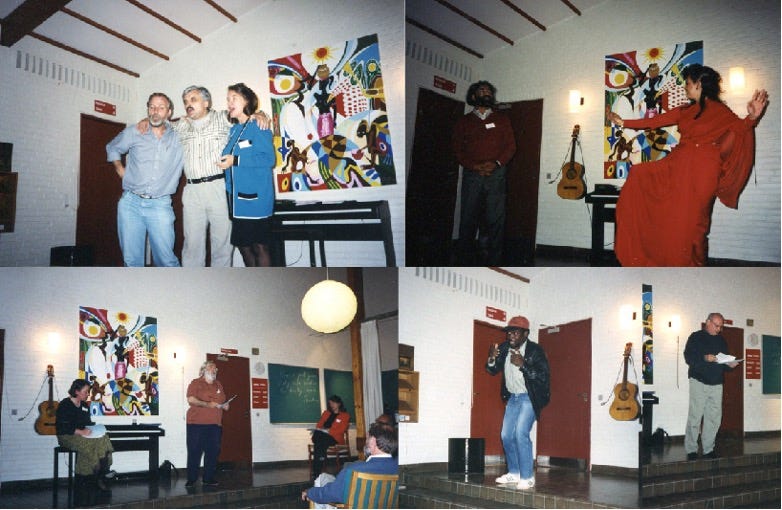
January 2021: New Day…:
I watched the sun rise this morning, the ducks swimming by south to north, the geese flying overhead north to south, the light spreading across the river—first a red strip, then orange…pink…a yellow ball peeking through the grove of trees across the water, then ascending the treetops…a golden globe heralding the day.
The river flows steadily towards an open expanse into the Chesapeake and ultimately into the Atlantic Ocean. It has been a mild winter so far, no ice on the water, just an occasional dusting of frost on the ground which melts with the sun.
On a flagpole by the river the American flag ripples in the breeze as the geese flap by. My dogs—one blonde, one black, both part Labrador and other breeds, wander along the river front, finding their smells and place to rest and watch the day unfold.
It is a new day…with a new government in my home city of Washington, DC….
January 2022: PEN Journeys: Memoir of Literature on the Line:
Publication Day—a combination of birthday, final exam, perhaps wedding day—the day when a book officially launches into the world, though in this pandemic time, the whistles and confetti and celebrations are at least postponed till spring and outside gatherings, but the book itself is on its way to whatever shores and audience will take it in.
PEN Journeys: Memoir of Literature on the Line officially enters the world February 1, 2022, though it has been available digitally on Kindle and AppleBooks for the past month, and at least one bookseller has been shipping as soon as orders were received because the publisher, Shearsman Books, had the books ready early….
January 2023: Waiting for Spring:
The winter solstice has passed, and each day adds two to three minutes of daylight.
The crocus buds have already broken through the soil. So far winter in the mid-Atlantic, at least in Maryland and Washington, DC, has been wet but not freezing though we are not yet safe from frost. I wish the buds would hold off, not be too anxious to pop above the ground. February can still be a fierce month.
In the garden the birds are clustered around the bird feeder for food which is still scarce on the trees. The squirrels have figured out how to tip the feeders and scatter the seeds and grain on the ground so they can run off with it. My dog spends hours at the window watching the squirrels, just waiting to get out to defend her turf. She’s taken the side of the birds which she also watches but allows with more tolerance in her corner of the garden.
She sees a fox and wants to chase after it though she is smaller but just as fast. It is mating season for the foxes, and they disappear into their den.
The early signs of spring are breaking out everywhere. We wait, not always patiently, for the earth to warm, the flowers to bloom, the cubs to emerge and disappear into the woods and for the earth to tilt towards the sun….
Galal El-Behairy (Egypt)
(Source PEN International, PEN America, English PEN)
Egyptian poet and lyricist Galal El-Behairy has sat in prison for the last six years, since March 2018. In September 2023 his incarceration exceeded the maximum legal limit of pre-trial detention without a trial.
Charged by a military court with “disseminating false news” and “joining a terrorist group,” El-Behairy served a 3-year sentence for his poetry but rather than being released, he was disappeared for a week and on return exhibited signs of torture. He appeared before the High State Security Prosecution and faced further charges of terrorist affiliation, dissemination of false news, abuse of social media networks, blasphemy, contempt of religion, and insulting the military.
According to Egyptian law, El-Behairy should have been released before reaching the limit for arbitrary detention; however, Egyptian authorities detain him still.
PEN International and other human rights organizations have challenged these charges and the detention in the belief that El-Behairy was prosecuted for his writings critical of the Egyptian authorities. He wrote lyrics for Egyptian musician Ramy Essam’s song and was arrested five days after the release of “Balaha.”
“El-Behairy has done nothing but write poetry. He should be living his life as a free man, with his family and loved ones, not languishing in prison,” insists PEN International President Burhan Sönmez.
On the fifth anniversary of his arrest March 2023, El-Behairy went on an 80-day hunger strike that threatened his life. When no action was taken to release him, he sent the following message ahead of the escalation of his hunger strike.
(translated by PEN International):
Against the life of coercion and the prison’s grave
Against the colours of the cell’s walls
Against the iron’s logic
Against the sensation of the sun behind bars and the wires
Against the prison’s uniform and food
Against the shining lights in my cell 24/7
Against the 20 minutes of the allowed time for the prison visit
Against the ban on pens and papers
Against the ban on lighters
Against the ban on all colours but white… the ban on white
Against 1912 nights in which I only saw the moon once, and by chance
Against every dream that dies over time and joins all my wasted dreams. Dreams of love, a home, establishing a family, fatherhood in my thirties, being beside my little sister in every hard step she takes in the sea of life, my dance with her on her big night, being there for my mom and dad as they are slowly devoured by time
Against myself, against every day I get away from the human inside, and become a concrete thing in a concrete place, under a concrete law
Against all this, and to save what is left, on the 1 of June, I will start a life strike to regain my life.
When he resumed his hunger strike on September 5, he expressed his desire to attend his younger sister’s wedding in October as a free man. On September 9 El-Behairy attempted suicide.
Over the course of his six-years imprisonment, El-Behairy’s health has significantly deteriorated due to torture and inhumane detention conditions, according to his family, and he suffers from depression.
PEN International, his family and other human rights organizations have expressed profound concern about his health and well-being and hold the Egyptian authorities responsible. They call for El-Behairy’s immediate and unconditional release and the dropping of all charges against him.
To Take Action:
You can send messages of solidarity to Galal El-Behairy through English PEN’s PENWrites Campaign.
Send appeals to the Egyptian authorities, urging them to:
· Release Galal El-Behairy immediately and unconditionally
· Drop all charges against him;
· Ensure that, pending his release, he is held in conditions that meet international standards for the treatment of prisoners, including by providing urgent access to adequate health care and regular communication with his family and lawyers.
Appeals to:
· Hamada El-Sawy
Role: Head of Egypt’s Public Prosecutor
Email: m.office@ppo.gov.eg
WhatsApp: +201111755959
· Abdel Fattah El Sisi
Role: President of Egypt
Email: p.spokesman@op.gov.eg
Send copies to the Egyptian Embassy in your own country. Embassy addresses may be found here: https://www.embassypages.com/egypt
You can reach out to your Ministry of Foreign Affairs and diplomatic representatives in Egypt, calling on them to raise the case of Galal El-Behairy with the Egyptian authorities and at bilateral fora.
#FreeGalal
An attack on a writer, the shutting down of a publishing house, the torching of a newspaper reduce the space in the world where ideas can flow. Freedom of expression is vital to writers and to readers but is challenged daily around the world. Listed here are organizations whose work on human rights and in particular issues of freedom of expression I’ve been engaged with directly and indirectly over the years. Some of the organizations have broader agendas, but all have contributed to keeping space open for the individual voice.
PEN International (with its 147 centers in over 100 countries)
PEN American Center
English PEN
PEN/Faulkner Foundation
Human Rights Watch
Amnesty International
Amnesty International USA
International Freedom of Expression Exchange (IFEX)
Committee to Protect Journalists (CPJ)
Article 19
Index on Censorship
Poets and Writers
Authors Guild
International Center for Journalists
This month I want to preview two books about to arrive in bookstores and in my own household. Ilium by Lea Carpenter will be published January 16 by Knopf, and 2054 by Elliot Ackerman and Admiral James Stavridis from Penguin Random House hits the shelves March 12.
Because these fine novels are by my daughter-in-law and my son, I admit bias and refrain from offering a reviewer’s perspective except to highly recommend both. Instead I share here words of others, both for summary and reviews.

Ilium is “set in the dark world of international espionage, from London to Mallorca, Croatia, Paris, and Cap Ferret” and is “the gripping and suspenseful story of a young woman who unwittingly becomes a perfect asset in the long overdue finale of a covert special op.
“The young English narrator…has grown up unhappily in London, dreaming of escape, pretending to be someone else and obsessed with a locked private garden. On the eve of her twenty-first birthday, at a party near that garden, she meets its charismatic and mysterious new owner, Marcus, thirty-three years older, who sweeps her off her feet. Before long they are married at his finca in Mallorca, and at last she has escaped into a new role – but at what price? On their honeymoon in Croatia, Marcus reveals there is something she can do for him—a plan is in place and she can help with ‘a favor….’
“Brilliantly compelling, this is a spellbinding and unexpectedly poignant story of a long- planned, high-stakes CIA-Mossad operation that only needed the right asset to complete.”
Kirkus’ starred review praises Ilium, “With its dreamily detached narration and elliptical feel, Carpenter’s third novel...is less interested in spy vs. spy...than the lack of reliable truths in people’s lives and the ways they allow themselves to be formed by events beyond their control....An edgy confessional novel with the trappings of spy fiction.”
Vogue endorses, "Lea Carpenter’s novel Ilium...has the surface tension of an espionage thriller, but it’s really a psychological study of a young British woman who is swept into a world of intelligence and finds herself undone by it. Reminiscent of the spare, strobe-lit storytelling of the late Joan Didion, Carpenter shows how wealth and sophistication paper over moral rot and how human attachment is a vulnerability when only posing and posturing keep you alive."
Novelist Yiyun Li, author of the award-winning The Book of Goose adds, “Sharp and riveting, Ilium is a literary novel that reads like a psychological thriller. As a masterful and beguiling storyteller, Lea Carpenter is the perfect guide for this journey to a secret place of intrigue and betrayals.”

2054 arrives as Elliot Ackerman’s and Admiral James Savridis’ second in a trilogy which premiered in 2022 with the novel 2034. For the early reviews and description, I share these words of others:
“From the acclaimed authors of the runaway New York Times bestseller 2034 comes another explosive work of speculative fiction set twenty years further in the future, at a moment when a radical leap forward in artificial intelligence combines with America’s violent partisan divide to create an existential threat to the country, and the world.
“It is twenty years after the catastrophic war between the United States and China that brought down the old American political order. A new party has emerged in the US, one that’s held power for over a decade. Efforts to cement its grip have resulted in mounting violent resistance. The American president has control of the media, but he is beginning to lose control of the streets. Many fear he’ll stop at nothing to remain in the White House. Suddenly, he collapses in the middle of an address to the nation. After an initial flurry of misinformation, the administration reluctantly announces his death. A cover-up ensues, conspiracy theories abound, and the country descends into a new type of civil war.
“A handful of elite actors from the worlds of computer science, intelligence, and business have a fairly good idea what happened. All signs point to a profound breakthrough in AI, of which the remote assassination of an American president is hardly the most game-changing ramification. The trail leads to an outpost in the Amazon rainforest, the last known whereabouts of the tech visionary who predicted this breakthrough. As some of the world’s great powers, old and new, state and nonstate alike, struggle to outmaneuver one another in this new Great Game of scientific discovery, the outcome becomes entangled with the fate of American democracy….”
A starred Publishers Weekly review notes, “Former Marine Ackerman and retired Navy admiral Stavridis follow up 2034 with another top-shelf thriller about near-future geopolitical turmoil….Spreading the narrative’s focus over many characters and nations, Ackerman and Stavridis paint a sweeping and resonant portrait of a world faced with a powerful technological advancement it doesn’t fully understand. The results are genuinely chilling.”
Simon Sebag Montefiore, author of The World: A Family History confirms: “2054 is a compelling, terrifying and totally plausible thriller of future world history and calamity–not so far away–crafted into a sophisticated geopolitical narrative superbly handled by this unique partnership of retired admiral/NATO supremo, and a prize-winning literary writer of beautiful novels who also happens to be a decorated Marine who served in Iraq and Afghanistan. Excellent–and a worthy sequel of their thriller 2034.”
[Both novels can be preordered at the link on the book titles above or at any bookstore or online bookstore.]
In London this summer I visited settings from my novel Burning Distance and wanted to continue to share some new scenes, along with passages from the book.

(Over the years I’ve accumulated a running list of words I haven’t known from two main sources: WordDaily and WordGenius)
Rizz Announced as Oxford’s Word of the Year
/riz/
Part of speech: noun
Charm, attractiveness, skill in flirtation, a person’s ability to attract a romantic or sexual partners
Examples:
“I’ve lost all my rizz, but I think it’s a sign of focus on school.”
It’s Gen Z slang that’s probably short for “charisma,” Oxford says. It sums up 2023’s confident mood as we moved on from 2022’s “goblin”
Esurient
/ə soor ee uhnt/
Part of speech: adjective
(Archaic or humorous) Hungry or greedy
Examples:
“When I skip breakfast, I feel positively esurient by lunchtime."
“You can count on Aunt Ida and her esurient dog to clear the table of any leftovers.”
“It’s not healthy to have such an esurient attitude with your finances.”
Stravaig
/stre veig/
Part of speech: verb
Wander about aimlessly
Examples:
“Let’s stravaig before the sun sets and it’s too chilly.”
“I went stravaiging about the woods behind my house and I found an old log cabin.”
“My dog stravaigs around the pastures every afternoon unless it’s raining.”
I’ve spoken at bookstores, university classes, book luncheons and in-person and zoom book clubs and look forward to more ahead. I enjoy giving readings and addressing audiences in many venues and moderating discussions on a wide range of topics.
Click here for a list of future and past public events.
Or fill out the speaking request form to schedule an event.
I like engaging with readers so if you are in a Reading Group or Book Club and read one of my books, I’m glad to be in touch by email, zoom, or when possible in person. I can also suggest discussion topics.
Fill out the reading group form here to schedule a meeting.








